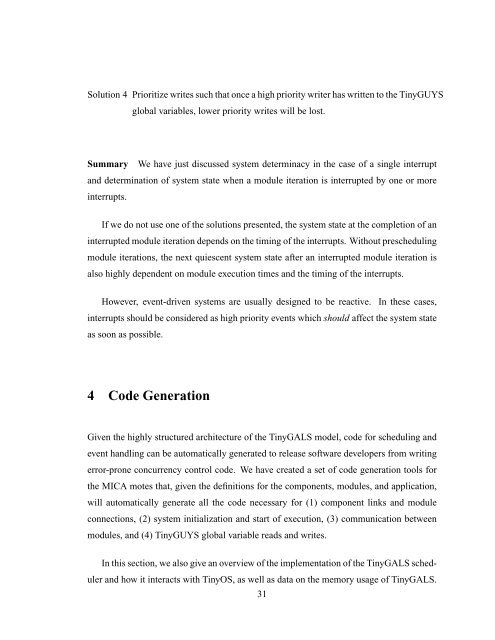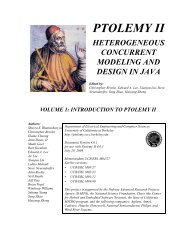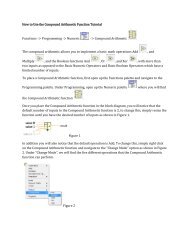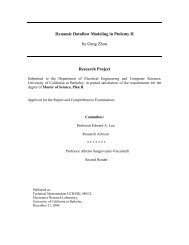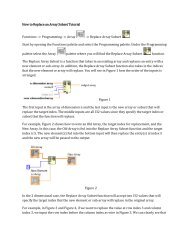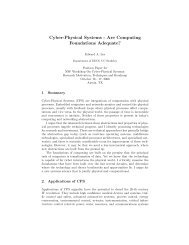Design and Implementation of TinyGALS: A Programming Model for ...
Design and Implementation of TinyGALS: A Programming Model for ...
Design and Implementation of TinyGALS: A Programming Model for ...
You also want an ePaper? Increase the reach of your titles
YUMPU automatically turns print PDFs into web optimized ePapers that Google loves.
Solution 4 Prioritize writes such that once a high priority writer has written to the TinyGUYS<br />
global variables, lower priority writes will be lost.<br />
Summary We have just discussed system determinacy in the case <strong>of</strong> a single interrupt<br />
<strong>and</strong> determination <strong>of</strong> system state when a module iteration is interrupted by one or more<br />
interrupts.<br />
If we do not use one <strong>of</strong> the solutions presented, the system state at the completion <strong>of</strong> an<br />
interrupted module iteration depends on the timing <strong>of</strong> the interrupts. Without prescheduling<br />
module iterations, the next quiescent system state after an interrupted module iteration is<br />
also highly dependent on module execution times <strong>and</strong> the timing <strong>of</strong> the interrupts.<br />
However, event-driven systems are usually designed to be reactive. In these cases,<br />
interrupts should be considered as high priority events which should affect the system state<br />
as soon as possible.<br />
4 Code Generation<br />
Given the highly structured architecture <strong>of</strong> the <strong>TinyGALS</strong> model, code <strong>for</strong> scheduling <strong>and</strong><br />
event h<strong>and</strong>ling can be automatically generated to release s<strong>of</strong>tware developers from writing<br />
error-prone concurrency control code. We have created a set <strong>of</strong> code generation tools <strong>for</strong><br />
the MICA motes that, given the definitions <strong>for</strong> the components, modules, <strong>and</strong> application,<br />
will automatically generate all the code necessary <strong>for</strong> (1) component links <strong>and</strong> module<br />
connections, (2) system initialization <strong>and</strong> start <strong>of</strong> execution, (3) communication between<br />
modules, <strong>and</strong> (4) TinyGUYS global variable reads <strong>and</strong> writes.<br />
In this section, we also give an overview <strong>of</strong> the implementation <strong>of</strong> the <strong>TinyGALS</strong> sched-<br />
uler <strong>and</strong> how it interacts with TinyOS, as well as data on the memory usage <strong>of</strong> <strong>TinyGALS</strong>.<br />
31


